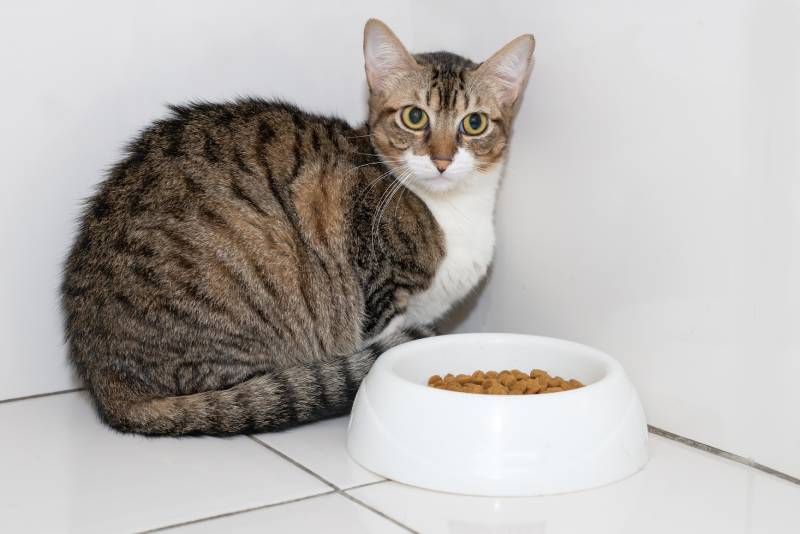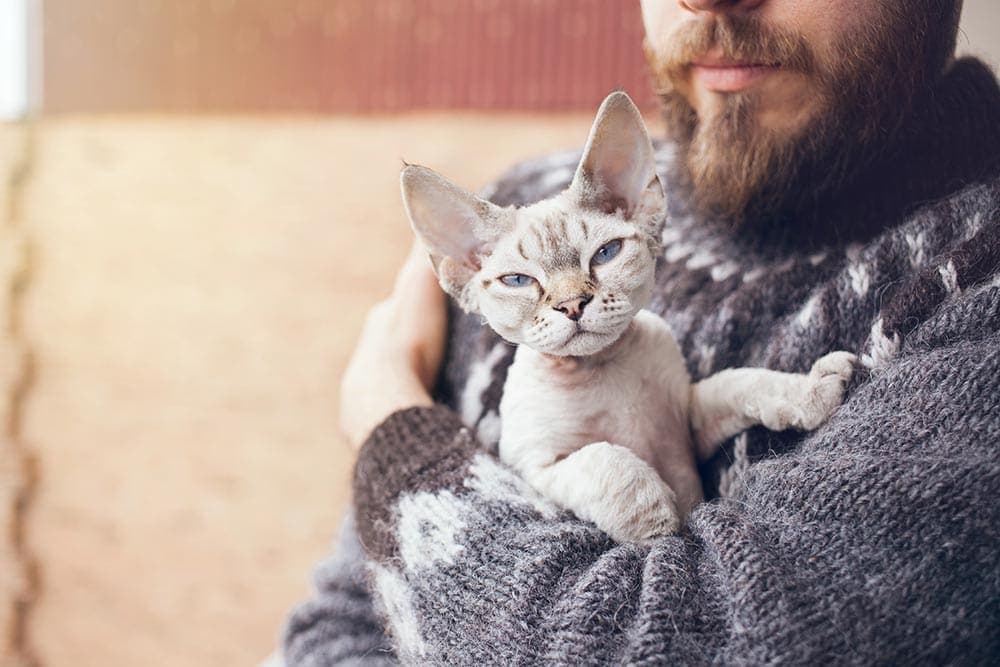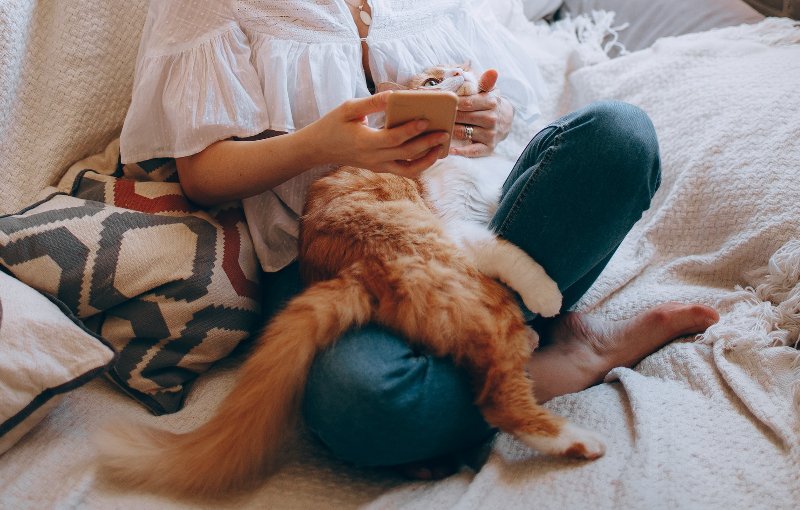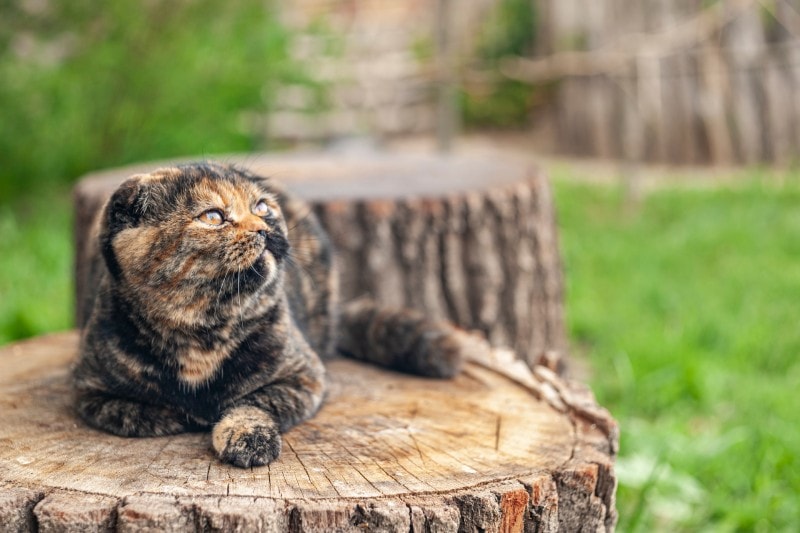My Cat Isn’t Eating Much but Acting Normal: 11 Vet-Reviewed Reasons
Updated on

Cats are notorious for being fussy eaters, often demanding particular foods that can leave even the most intuitive pet parents scratching their heads as to why they may not be eating. It is always pleasant to see your cat happily eating, and we like to know they are healthy and enjoying their days. When they start to eat less though, it can be unsettling, as a cat eating less than normal or not at all is something to investigate.
Although eating less can mean there is an underlying medical condition, even if they are acting normally, it can also be due to less serious reasons that are easily solvable. Here are 11 possible reasons your cat may be eating less but acting fine.
The 11 Possible Reasons Your Cat Isn’t Eating But Acting Normal
There can be numerous reasons for your cat not eating as much as they have been yet still acting normal. Here we explore a scale of reasons why, from the less serious to the more concerning.
1. Change of Food
A change of food is at the top of the list as to why your cat is eating less but otherwise acting fine. Cats are fussy eaters but also creatures of habit, and if their food has changed—either the flavor or format (dry, wet, pate, meat in gravy, meat in jelly, or a new prescription diet for a medical condition)—then they are very quick to turn their noses up at it if they don’t approve.
You may want to try adding a bit of their original food in with the new diet and see if they begin eating as normal again. If they do, gradually reduce the old food and increase the new food. It is also worth checking if the manufacturer has recently changed the ingredients, as this can change the taste of their normal food and trigger your cat into no longer liking it.
While providing our feline companions with high-quality food is paramount, selecting the right food and water bowl is equally important. The modern yet practical design of our Hepper NomNom Cat Bowl combines cat-catered features, like whisker-friendly shallow dishes and slight elevation, with a contemporary style aimed at protecting your floors from messy eating and drinking. The NomNom is entirely dishwasher safe and was thoughtfully created with your cat’s health and well-being in mind.
2. Recent Vaccination
If you have ever had a vaccine, you may be able to relate to feeling a bit off-color for a few days. If your cat has recently had a vaccination, then it is not uncommon for them to feel a little nauseous or unwell for around 48 hours. Should this behavior continue past this time frame, though, then consult with your vet, as they may be suffering a bad reaction to the vaccine or experiencing a problem at the injection site.
3. Home or Environmental Changes
Any change in the home or your cat’s environment can disrupt them. Cats are sensitive and generally do not cope well with change in their routine, especially if it’s a sudden one. Examples of such changes could be workmen in the house or outside, a new baby or pet, a new cat in the neighborhood, or moving to a new house.
If you feel this is the issue, then have a chat with your vet to discuss how to reduce their anxiousness. This may be done by modifying the environment in a suitable way or using products such as feline pheromone sprays and diffusers to instill calmness again.

4. Recent Stay at a Different Location
This likely falls within the realm of their routine being disrupted again, but if your cat has been staying away from home, like at a friend’s house or the vet’s office, then they can feel out of sorts for a few days upon their return home. Patience and persistence are required, and normality usually resumes shortly after.
5. Obtaining Food Elsewhere
Our cheeky feline friends are exceptional at finding luxury and food in all kinds of places, like a neighbor up the road who is feeding your cat, or maybe your cat has found a garbage can with food they can easily access. This is often seen with outdoor cats. If you have an outdoor cat who is not eating all their dinner, ask your vet to check them over for other potential problems. If they are given a clean bill of health, then they are more than likely eating somewhere else!

6. Uncomfortable Temperature
When it is too hot, stuffy, or humid, this can cause cats to lose interest in their food temporarily. This applies to both indoor and outdoor cats, and often, this situation resolves itself over the course of a few days or when the temperature starts to return to a comfortable temperature. Always make sure they have access to and are drinking water to prevent dehydration. Should it not resolve or if they show other signs of being unwell, have your cat checked over.
7. Respiratory Infections and Allergies
Most cats appreciate being able to be able to smell their food before they eat it. If they can’t smell it, often they will leave it or only consume a little. Respiratory infections, viruses like cat flu, and allergies can all cause a stuffy nose, breathing difficulties, runny eyes, lethargy, and/or a fever.
Check in with your vet in case they need examining and treatment, but also, you can try warming their food to increase the smell. This helps to encourage eating, as can adding in more pungent-smelling foods, such as tuna in water.

8. Dental Disease
Dental disease is present in many cats, ranging from mild to severe. They can often be acting fine until mealtime, as it is sometimes uncomfortable, painful, or difficult to eat. This is prevalent more so with dry food, as it requires more mechanical action to eat and is harder on the teeth and gums. If you are able to, have a quick look in your cat’s mouth to see if there are any broken teeth, inflamed gums, lumps, injuries, or foreign bodies stuck in between teeth. However, don’t risk getting bitten either. Have a chat with your vet about dental care and cleaning procedures.
9. Stress or Anxiety
As many pet parents may understand with these conditions, stress and anxiety can put your cat off their food or reduce their appetite. Depending on the cause of the anxious behavior, it may be a quick fix and then return to normality within a few days, or it could be a larger problem that requires the help of your vet or a cat behaviorist alongside medication.

10. Digestive Upsets
Digestive ailments such as vomiting, diarrhea, and inflammation of the gastrointestinal tract are unpleasant and uncomfortable. Often, they can be well otherwise, and the gastro mishap is a passing transient episode.
Many bugs or soured food can cause these issues, but should the reduced eating and digestive problems continue, or you notice other signs like weight loss, take your cat for a check-up with your veterinarian.
11. Medical Conditions
There is a long list of different medical matters that may cause your cat to eat less than normal. This is particularly evident in the early stages of certain illnesses. Initially, this may be the only indicator of a problem. If, however, you have ruled out the above reasons and the decreased eating continues, have your veterinarian examine your cat to check for underlying conditions causing the concern with their eating habits.
- Kidney disease
- Liver disease
- Heart disease
- Thyroid problems
- Diabetes
- Cancer
- Pain
Conclusion
Many reasons may cause your cat to eat less but still act normal, and, in these cases, the solution is relatively easy to rectify or implement. Some reasons may be of a more serious nature and will require a veterinarian investigation and/or treatment. In any event, if it continues, have your cat checked over to ascertain the root cause so treatment can begin.
Featured Image Credit: Elayne Massaini, Shutterstock













